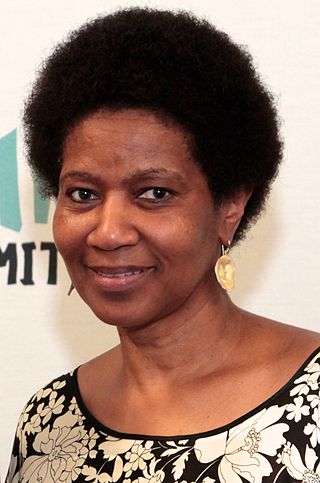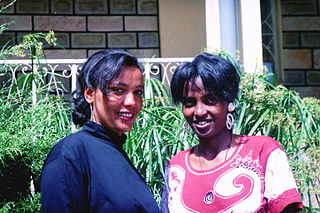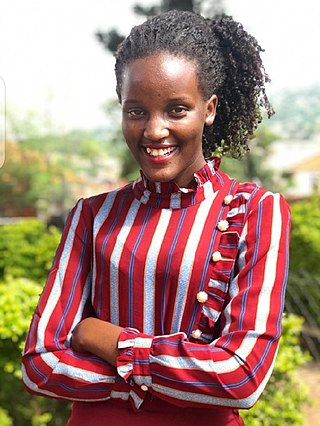Related Research Articles
The Association for Progressive Communications (APC) is an international network of organizations that was founded in 1990 to provide communication infrastructure, including Internet-based applications, to groups and individuals who work for peace, human rights, protection of the environment, and sustainability. Pioneering the use of ICTs for civil society, especially in developing countries, APC were often the first providers of Internet in their member countries.

Phumzile Mlambo-Ngcuka is a South African politician and former United Nations official, who served as the Executive Director of UN Women with the rank of Under-Secretary-General of the United Nations.

Africa University is a "private, Pan-African and United Methodist-related institution." It has over 1,200 students from 36 African countries. It is located 17 km northwest of Mutare, Zimbabwe in Penhalonga. It grants bachelor's, master's and PhD degrees in various programs.

Mahnaz Afkhami is an Iranian women's rights activist who served in the Cabinet of Iran from 1976 to 1978. She is founder and president of Women's Learning Partnership (WLP), executive director of the Foundation for Iranian Studies and former Minister of Women's Affairs in Iran's pre-Revolution government. She has lived in exile in the United States since 1979.

Haja Zainab Hawa Bangura is a Sierra Leonean politician and social activist who has been serving as the Director-General of the United Nations Office at Nairobi (UNON) since 2018, appointed by United Nations Secretary-General António Guterres. She served as the second United Nations Special Representative on Sexual Violence in Conflict with the rank of Under-Secretary-General of the United Nations from 2012 to 2017, in succession to the first holder of the post, Margot Wallström. In 2017 she was succeeded by Pramila Patten.

The International Alliance of Women is an international non-governmental organization that works to promote women's rights and gender equality. It was historically the main international organization that campaigned for women's suffrage. IAW stands for an inclusive, intersectional and progressive liberal feminism on the basis of human rights and liberal democracy, and has a liberal internationalist outlook. IAW's principles state that all genders are "born equally free [and are] equally entitled to the free exercise of their individual rights and liberty," that "women's rights are human rights" and that "human rights are universal, indivisible and interrelated."

There have been several studies concerning women in Ethiopia. Historically, elite and powerful women in Ethiopia have been visible as administrators and warriors. This never translated into any benefit to improve the rights of women, but it had meant that women could inherit and own property and act as advisors on important communal and tribal matters. As late as the first part of the 20th century, Queen Menen, consort of Emperor Haile Selassie I, had a decisive role in running the Ethiopian Empire. Workit and Mestayit regents to their minor sons have been held responsible for their provinces. They owed their rights to landed property because of a special type of land tenure that expected tenants to serve as militia to overlords, irrespective of gender. In 1896, Empress Tayetu Betul, wife of Emperor Menelik II, actively advised the government and participated in defending the country from Italian invasion. Prominent and other landowning women fought against the second invasion in 1935–41. With the assistance of European advisors, women in the ensuing period were kept out of the army and politics, even as advisors. Instead, they were restricted to family and household work of raising children and cooking. With a steady increase in female representation in education, they have started to undertake nursing, teaching, and other similarly supportive roles. Over the 2018–2019 period, their gradual participation in state politics has been increasing at a steady pace.

Women of Liberia Mass Action for Peace is a peace movement started in 2003 by women in Monrovia, Liberia, Africa, that worked to end the Second Liberian Civil War. Organized by Crystal Roh Gawding and social workers Leymah Gbowee and Comfort Freeman, the movement began despite Liberia having extremely limited civil rights. Thousands of Muslim and Christian women from various classes mobilized their efforts, staged silent nonviolence protests that included a sex strike and the threat of a curse.
The United Nations Entity for Gender Equality and the Empowerment of Women, also known as UN Women, is a United Nations entity charged with working for gender equality and the empowerment of women. UN Women is charged with advocating for the rights of women and girls, and focusing on a number of issues, including violence against women and violence against LGBT people.

HeForShe, often referred to as He for She, is a solidarity movement for the advancement of gender equality initiated by the United Nations. Grounded in the idea that gender inequality is an issue that affects all people, socially, economically and politically, HeForShe is a global effort that seeks to involve men and boys in achieving equality by taking action against negative gender stereotypes and behaviors. Its logo represents the union of women and men working together to achieve gender equality, by joining together aspects of both the female and male symbols.
Joanne Ninive Smith is a first-generation Haitian-American social worker and activist born and raised in New York City. She is the executive director and founder of the Brooklyn-based non-profit organization, Girls for Gender Equity. Smith has organized around the issues of gender equality, racial justice, school pushout, sexual harassment, police brutality, the criminalization of black girls in schools and violence against transgender and gender non-conforming people of color.
Olaoluwa Abagun is a Nigerian lawyer, Feminist, and a Vocal Girls' Rights Advocate, nurturing a dynamic generation of African Girls. She is the Founder of the Girl Pride Circle Initiative, a notable girl NGO situated in Nigeria, she holds the position of Executive Director at ATHENA, a global feminist network dedicated to promoting gender equality and upholding human rights

Vanessa Nakate is an Ugandan climate justice activist.
Cecilia Chimbiri is a Zimbabwean pro-democracy activist and human rights defender. She served as Acting Youth Chairperson of the MDC Alliance. She is a member of the Citizens Coalition for Change led by Nelson Chamisa.
Fatou Jeng is a Gambian youth climate activist. She was named among the 30 most influential young Gambians of 2019.

Nyaradzo 'Nyari' Mashayamombe is a Zimbabwean women's and human rights activist and campaigner, a media entrepreneur, and a part-time recording afro-jazz singer and poet. She is the founding executive director of Tag A Life International Trust (TaLI), an advocacy organization that promotes girls' and young women's rights and empowerment in Zimbabwe. Nyari is also the founder and CEO of Identities Media Holdings, a company that produces content that is featured on the only free to air national television station in Zimbabwe and on social media. As a recording artist, Nyari has released three studio albums.

Feminism in Indonesia refers to the long history of discourse for gender equality to bring about positive social change in Indonesia. The issues women in Indonesia currently are facing include gender violence, underage marriages, and lack of representation in the political system. Feminism and the women's right movement began during colonial Indonesia under Dutch rule and were spearheaded by the national heroine Kartini, a Javanese noblewoman who advocated for the education of all women and girls regardless of social status. In the early 19th century, women's rights organizations and movements were allowed to developed under Budi Utomo, the first Indonesian Nationalist organization. Modern day Indonesian feminism include and are influenced by both fundamentalist and progressive Islamic women's organizations.

Hajer Sharief is a Libyan peace and human rights activist. She co-leads the work of the Together We Build It (TWBI) organization in Libya. In 2011, and at the age of 19, Sharief co-founded TWBI to build peace in Libya and promote human rights. She is one of UN Women's 12 Champions on Women, Peace and Security, and Human Rights; and a member of the Extremely Together young leaders initiative, begun by Kofi Annan and the Kofi Annan Foundation. In 2020, Forbes named Sharief as one of "Africa's 50 Most Powerful Women", and she was listed by Avanec Media among their "100 Most Influential African Women" for 2020. A winner of the Student Peace Prize in 2017, she was nominated for the Nobel Peace Prize in 2019.
Alice Banze is a trained social scientist with a career in civil society organizations like Oxfam, and Gender Links and government. She is the executive director of Gender and Sustainable Development Association and a member of the UN Women-supported African Women Leaders Network. In December 2020, Banze was elected member of the National Elections Commission with the support of the Women's Forum, an umbrella grouping of Mozambican women's rights organizations.
Awa Ndiaye-Seck is a Senegalese national who serves as the United Nations Resident Representative in the Democratic Republic of Congo and Special Representative of the Executive Director on AWLN at UN Women. Awa has previously worked with the United Nations Development Programme (UNDP) and also served in the United States Agency for International Development (USAID) in various capacities.
References
- ↑ "Who We Are". youngwomeninstitute.net. Archived from the original on 2022-09-28. Retrieved 2022-03-15.
- ↑ "Ten African Women leaders we admire". UN Women – Africa. Retrieved 2022-03-15.
- ↑ FORUM2000.CZ. "Glanis Changachirere". Forum 2000. Retrieved 2022-03-15.
{{cite web}}: CS1 maint: numeric names: authors list (link) - ↑ "Glanis Changachirere (Zimbabwe)". World Movement for Democracy. Retrieved 2022-03-15.
- ↑ "Ten African Women leaders we admire".
- ↑ Walravens, Samantha. "Salesforce CFO Amy Weaver On Leading With Kindness And Authenticity". Forbes. Retrieved 2022-03-15.
- ↑ "Glanis Changachirere (Zimbabwe)". World Movement for Democracy. Retrieved 2022-03-15.
- ↑ "Glanis Changachirere". NATIONAL ENDOWMENT FOR DEMOCRACY. 2016-10-04. Archived from the original on 2022-09-28. Retrieved 2022-03-15.
- ↑ "Politician of the Year Award Judges 2022 | One Young World". www.oneyoungworld.com. Retrieved 2022-03-15.
- ↑ "Glanis Changachirere (Zimbabwe)". NED at 30 Years. 2013-08-07. Retrieved 2022-03-15.
- ↑ "Glanis Changachirere (Zimbabwe)". World Movement for Democracy. Retrieved 2022-03-15.
- ↑ "Who We Are". youngwomeninstitute.net. Archived from the original on 2022-09-28. Retrieved 2022-03-15.
- ↑ "Ten African Women leaders we admire". UN Women – Africa. Retrieved 2022-03-15.
- ↑ "Glanis Changachirere (Zimbabwe)". World Movement for Democracy. Retrieved 2022-03-15.
- ↑ "16 women championing the fight against Gender-Based Violence in East and Southern Africa". UN Women – Africa. Retrieved 2022-03-15.
- ↑ "The Gendering of Violence in Zimbabwean Politics | African Arguments". 2020-12-08. Retrieved 2022-03-15.